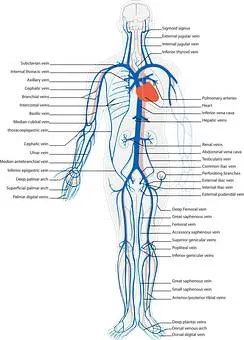This week, we’re diving into body systems because the body is your first go-to when you’re not feeling your best – your body sends you signals but it’s up to you to listen, and give your body some love!
Did you know that there are 12 systems in your body? 12! There’s the…
- Immune System
- Respiratory System
- Nervous System
- Digestive System
- Cardiovascular or Circulatory System
- Urinary System
- Integumentary System
- Muscular System
- Skeletal System
- Reproductive System
- Lymphatic System
- Endocrine System
… and now you know!
Wow, right! I mean, the body is unbelievable – It is basically designed to be perfect. It’s probably the only thing ever that you could attach the word ‘perfect’ to.
But then we come in and push ourselves (i.e. our bodies) so hard like when we work long hours sitting at our desks without a break.
And don’t get me started on what we expose our bodies to on a daily basis: chemicals, toxins, processed food, etc. Like when we clean our house with bleach or other toxic cleaners.
All this takes a toll on our body, and it can’t operate as perfect because it’s too busy trying to process what we consume to be able operate at the pace that we demand.
It can get to a point, that if we’re not careful, it’s going to start shutting down or it’s not going to be able to keep up, which could result in fatigue or something more serious like an illness.
So, what do all of these systems do?
I’m so glad you asked ;
Immune System
This system is a whole network of antibodies, white blood cells, proteins, as well as lymph nodes, tonsils, thymus, bone marrow, and the spleen.
Because our body is the perfect place for microbes, such as viruses, bacteria, fungi, and parasites, our immune system works to prevent and limit the entry and growth of said microbes in order to keep our body healthy.
Respiratory System
This system – the upper and lower respiratory tracts – consists of the nasal cavity, sinuses, pharynx, larynx, trachea, lungs, diaphragm, and bronchi.
Its primary job is to supply oxygen to your whole body and filter and regulate the temperature and humidity of the air we breathe.
Nervous System
Ok, so this system is actually 2 parts: the central nervous system and the peripheral nervous system. It is made up of the brain, spinal chord and nerve fibers around the spinal chord that branch off and extend to all parts of the body including the neck, arms, torso, legs, skeletal muscles and internal organs.
This system gives us the ability to perceive, comprehend and respond to what’s around us, and is responsible for essential functions like breathing and digestion.
Digestive System
We’ve touched on this system before – it includes the mouth, throat, esophagus, stomach, small intestines, colon, rectum, and anus.
This system breaks down food into nutrients which we all know the body uses for energy, growth, and cell repair. Think about this as you eat and drink. Is it something that my body will love me for and give me energy or is it something that it will make me feel bla like (insert bloated, tired, lethargic, etc.).
Cardiovascular or Circulatory System
This is your heart, blood vessels and about 5 Litres of blood that gets transported by your blood vessels.
This system is responsible for transporting oxygen, nutrients, hormones, and cellular waste products throughout your body. It’s powered by your heart, which is the body’s hardest working organ, so be good to it – work it out and let it rest.
Urinary System
This system is made up of your two kidneys, two ureters, a urinary bladder and the urethra. (Ureters are the ducts by which urine passes from the kidney to the bladder or cloaca.)
So, these organs as you may already know work together to help the body get rid of waste and excess water in the form of urine. They help transport urine or store urine and release it when it’s time.
Integumentary System
This is one that I for one can’t really pronounce, let alone remember learning about in science class although I’m sure I did because it’s king of a big deal. It consists of the skin, hair, nails, glands, and nerves.
Its main function is to act as a barrier to protect the body from the outside world. It also works to retain body fluids, protect against disease, eliminate waste products and regulate body temperature.
Muscular System
Attached to your bones of the skeletal system are about 700 named muscles that make up roughly half or your body weight! How’s that for a fun fact?! Each muscle is made up muscle tissue, blood vessels, tendons and nerves. Muscle tissue is also found in the heart, digestive organs, and blood vessels.
Skeletal System
This may be an obvious one – it’s your bones, cartilage and joints that make up the human skeleton.
This system is your basic framework, giving you structure, protection and movement. When you’re an adult, you have 206 bones that produce blood cells and store important minerals, like calcium.
Fun Fact: You have about 300 bones when you’re born.
Reproductive System
The main organs in this system include the external genitalia (the penis and vulva) and internal organs (ovaries for women, testicles or testes for men) that produce gamete (egg for women, sperm for men).
The four main function of this system are:
- produce egg and sperm cells
- transport and sustain these cells
- nurture developing offspring
- produce hormones
Lymphatic System
This system is a whole network of tissues and organs made up of lymph vessels, lymph nodes and lymph. The tonsils, adenoids, spleen and thymus are also all part of this system.
Fun fact! There are 600-700 lymph nodes in our body that filter lymph before it returns to the circulatory system. Lymph is this clear white fluid made up of white blood cells that attack bacteria in the blood and of chyle, a fluid from the intestines that contains proteins and fats.
The main functions of the lymphatic system are to manage fluid levels, to filter out bacteria, and to house types of white blood cells. The lymph that we talked about earlier is filtered through the spleen, thymus and lymph nodes before it is emptied into the blood.
Endocrine System
This one we definitely went into detail when we talked about stress, so to recap: this system is made up of the pineal gland, hypothalamus, pituitary gland, thyroid gland, adrenal glands, pancreas, and testicles/ovaries.
It’s the system that produces hormones that regulate metabolism, growth and development, tissue function, sexual function, reproduction, sleep, mood, and some other things.
Source: The Oil Academy
The real takeaway…
Treat your body good!
Think about what you’re eating, drinking and exposing your body to (think cleaners, moisturizers, deodorant, toothpaste, laundry detergent, etc.).
I’m always here to help if you’re looking for ideas to remove toxins from your life, and yes, it can include essential oils but if that’s not your thing, it’s not your thing, and that’s all good – the main thing: eating whole foods and exercising daily.
If you’re not feeling your best, like you’re always low on energy or you feel stuck, my Make It Happen Mentorship program might be for you. It’s all of the steps I used to get out of my funk, get healthy, and live my dream life – I mean, if I can do it, you for sure can!
Join my Life Fulfillment Academy Community for more fun too – recipes, techniques, all sorts of good stuff to support your health in a natural and loving way! We also have a 10 and 30 day fitness challenge coming up so you can join in the fun, and bring your friends!
Until next time!
Get the Insider News & Blog updates right to your inbox.
[wd_hustle id=”email-subscribe” type=”embedded” css_class=””]




